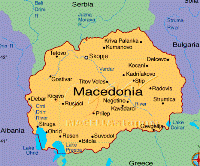Macedonia’s Name: Breaking the Deadlock, the latest International Crisis Group briefing, analyses attempts to resolve the dispute, and the consequences of failure for Macedonia and the surrounding region. Although there is no imminent risk of a return to violence between ethnic Macedonians and the Albanian minority, the disagreement between Skopje and Athens puts at risk the progress achieved since the 2001 Ohrid Agreement that ended an incipient civil war in the one-time Yugoslav republic.
After Greece blocked Macedonia’s NATO entry at the April 2008 Bucharest summit, relations between the two countries deteriorated to levels not seen since the early 1990s. Athens now threatens to similarly oppose the start of Macedonia’s EU membership negotiations. The Macedonian government of Prime Minister Nikola Gruevski shares some responsibility. Renaming Skopje Airport after Alexander the Great and a number of other moves were seen by Greeks as an offensive appropriation of their Hellenic heritage and a direct provocation.
“By blocking NATO and EU integration, Greece appeared to contravene its undertaking in the 1995 Interim Accord between the two states not to let the name issue stand in the way of Macedonia’s membership of international organisations”, says Sabine Freizer, Crisis Group’s Europe Program Director. “Pending agreement, Skopje should use its provisional name, ‘the former Yugoslav Republic of Macedonia’, in all multilateral forums, and Athens should drop its veto threats”.
To tackle the issue, both sides must first rebuild trust. Skopje should avoid provocations and accept the UN mediator’s latest proposal to rename the country as the “Republic of North Macedonia”. Skopje and Athens should undertake to examine the common history of the region in order to reach a basic understanding and avoid references in educational curriculums that offend the national sensibilities of either country.
Greece should accept the “Macedonian” identity and language of its northern neighbour bearing in mind that this does not imply exclusivity and does not challenge the application of the same adjective to the inhabitants of the Greek province of Macedonia.
“This is more than a bilateral dispute between Skopje and Athens. It risks derailing the main strategy of both NATO and the EU for stabilising Macedonia and the region, based on enlargement and integration”, warns Donald Steinberg, Crisis Group Deputy President.





